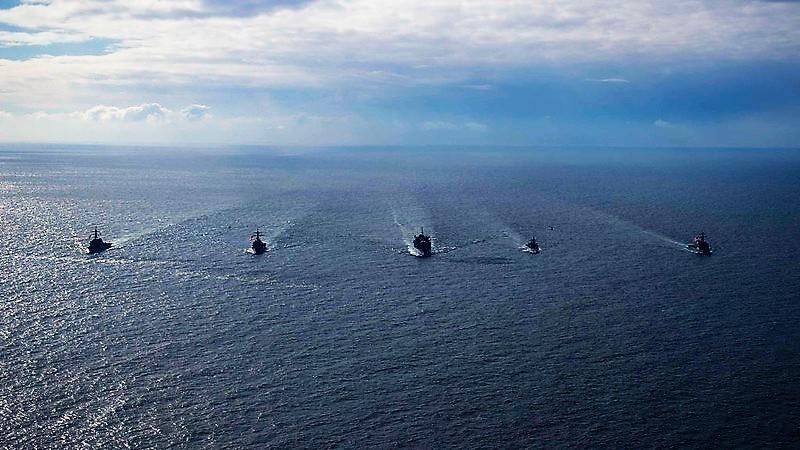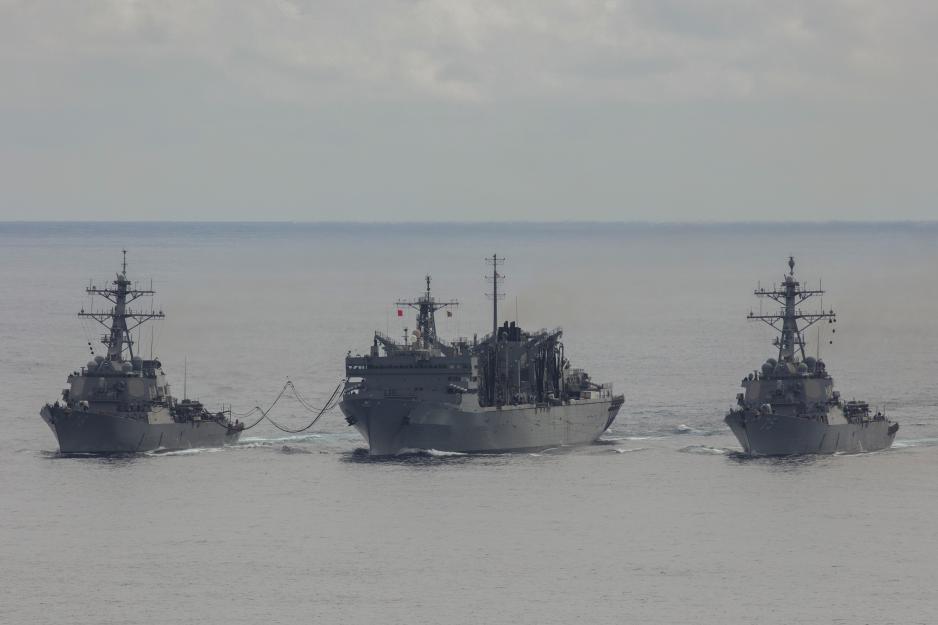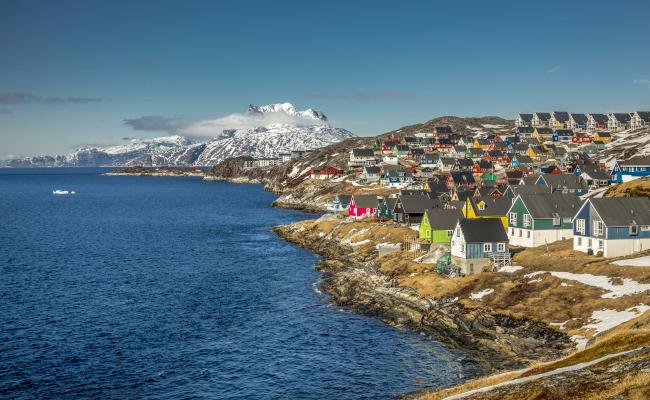U.S. Freedom of Navigation Operation in the Arctic: "Would Be a High-Risk Gesture with Unpredictable Consequences"

U.S. missile destroyers during the joint operations to ensure maritime security in the Arctic Ocean, May 5, 2020. (U.S. Navy photo by Mass Communication Specialist Seaman Austin G. Collins/Released).
In an interview with High North News, Senior Fellow Paul Taylor at Friends of Europe says that much of the recent U.S. military activity in the European High North makes sense. But if the U.S. went further and staged a Freedom of Navigation operation in the region, it could trigger an escalation of tensions, he argues.
In the newly published Friends of Europe report “After the ice: The Arctic and European security”, Senior Fellow Paul Taylor at Friends of Europe reexamines several assumptions about the Arctic.
While concluding that the risk of a conflict starting in the region remains very low, Taylor lists five potential triggers for escalation, one of them being an aggressive US Freedom of Navigation operation in the High North.
Taylor explains that much of the recent increase of U.S military presence in the European High North is a response to Russia and that the military presence not necessarily is illegitimate; the upgrading of situational awareness, surveillance, and improving the ability to operate in extreme weather conditions are things that makes sense, he says.
“However, in my judgement, an instance that would go beyond that would be if the US decided to stage a freedom of navigation operation (FONOP) along the Northern Sea Route," he adds.
"I don’t see what vital interests that would serve. It would be very provocative to Russia and you would have to think it through and ask how Russia would respond if they did. The long-term consequences of doing something like that might not be what the U.S. desires."
This would be a high-risk gesture with unpredictable consequences.
“Hotly debated”
In 2019, former Secretary of the Navy Richard V. Spencer talked about conducting a FONOP in the Arctic region.
Spencer said the rapid opening of the Arctic Ocean to shipping traffic requires the Navy’s presence in the region. He confirmed that the planned voyage would be a freedom of navigation exercise, but did not confirm if this would involve a voyage along or near the Northern Sea Route.
Taylor states that the Secretary of the Navy was “widely assumed to have been talking about sending navy ships along the Northern Sea Route, rather than challenging Canada’s claims in the Northwest Passage.”
While the operation did not happen, he says there is a lot of debate about conducting such an exercise.

Arctic sea routes - Northern sea route and Northwest passage. The Canadians and Russians both claim these passages as internal waters. (Photo: Hugo Ahlenius / GRID Arendal).
A senior US official cited in the report says “that’s been talked about inside the US government but there has been no decision, no determination that something like that should happen,” when asked whether Washington was still considering a FONOP on the Northern Sea Route.
Taylor notes that it "would be a high-risk gesture with unpredictable consequences.”
"The value of conducting such a patrol is hotly
debated within the US strategic community, with many analysts points to the risk of embarrassment if the ships encountered ice, and the danger of military escalation in an area which is of vital interest to Russia but of little use to the West.”
In an article for the U.S. Naval Institute (USNI), Assistant Professor at the U.S. Naval War College Dr. Rebecca Pincus writes that the plans for Arctic operations discussed by U.S. Navy leaders are premature and potentially dangerous.
“Challenging Russia in the NSR is perhaps one of the strongest provocative legal actions Washington could use to throw down a gauntlet at Moscow. It is hard to see how this level of provocation is justified by the present circumstances.”
Also read
Exercises in the Barents Sea
When British and American navy vessels conducted maritime security operations in the Barents Sea in May 2020, the U.S. Navy stated they asserted freedom of navigation.
At a Russia seminar held by the Norwegian Institute of International Affairs (NUPI) on September 9, Dr. Rebecca Pincus explained that such exercises often are reported as FONOPS.
She said that while these exercises are conducted in support of broader objections of Rule of Law and Freedom of the Seas, they are not specifically FONOPS, which constitute a much more narrow box.
"There are no disputed maritime claims in the Barents Sea, and the US and Allies have stayed away from the claims that are disputed in that region," she adds.

The USS Donald Cook, USSS Porter and USNS Supply during a British-American exercise in the Barents Sea in April/May. “When US and British warships staged a demonstrative joint naval exercise in the Barents Sea close to the Kola Peninsula in May 2020 in the midst of the COVID-19 crisis, trumpeting a signal about freedom of navigation in international waters, Norwegian ships did not join them,” Paul Taylor writes. Photo: Dan Rosenbaum.
"A flashier flashpoint"
Besides the Americans staging a FONOP in the Arctic, Taylor lists four other potential triggers for incidents in the region that might escalate:
- an incident between Russia and Norway over the application of the Svalbard Treaty,
- a standoff over search-and-rescue or disaster relief involving an Arctic cruise liner, or a shipping accident, a major oil spill or radiation leak;
- heightened geopolitical tension over Greenland’s quest for independence from Denmark;
- an unclaimed sabotage attack on subsea communication cables or a military accident caused by jamming or spoofing of satellite navigation equipment.
Do you see any of them more likely than others?
“I think that if an incident like a FONOP happened, it would be more likely to lead to some kind of military development. You could see how it could escalate, but I don’t think it is likely that the U.S. would do it. Greenland is in some ways a "flashier flashpoint", but not necessarily because it is more likely to lead to an immediate military incident."
Taylor points to the inherent tension within Greenland and ambitions of independence from Denmark.
According to the report, "one of the potentially most destabilising factors in Arctic geopolitics could be a drive by Greenland’s Inuit majority for independence from the Kingdom of Denmark, especially if it turned into an open contest between the United States and China for influence on the strategic island. Greenland will need to achieve economic viability to attain political independence.”
“Currently, Greenland doesn’t have the financial resources for independence, but they want the financial resources to give them the option. But where are those resources and investments going to come from? What if Greenland were to have a referendum on independence that is backed by Chinese investments, what would the Americans do? I don’t think they would sit by and let that happen,” Taylor says.






